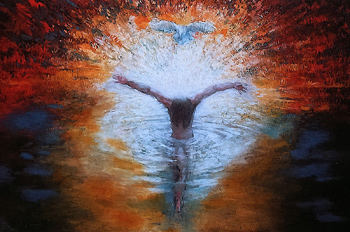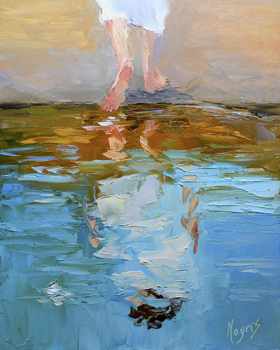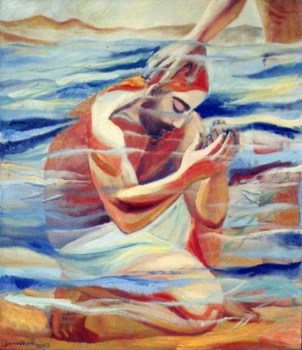For Sunday January 9, 2022
Lectionary Readings (Revised Common Lectionary, Year C)
Isaiah 43:1-7
Psalm 29
Acts 8:14-17
Luke 3:15-17, 21-22
I love the yearly rhythm of our Church seasons, but I’ll admit that I find the transition from Christmas to Epiphany a bit jarring. One minute, we’re gazing at a swaddled baby. The next, we’re whizzing past a toddler, an array of gift-bearing Magi, a young family fleeing to Egypt, a twelve-year-old boy in a temple, and a mother, pondering all these things in her heart. And then?
Then we’re standing in a long line of people by the banks of the Jordan River. Ahead of us, waist-deep in the water, John the Baptist bellows a no-nonsense call to repentance. Behind us, at the very end of the long line, stands that once-upon-a-time baby — all grown up. Thirty years have gone by, and the promised child is about to come into his promise.
On the other hand, even though the “fast forward” between seasons feels abrupt, I’m grateful that the first glimpse we get of Jesus’s adult life is during his baptism. I’m especially grateful this year, because the baptism story recorded in the Gospels speaks to a question we all need to be asking in these difficult and divisive times: how can we live well together? How can we belong well together? What must we do to embrace a truly common life as human beings coexisting on this struggling planet?
The word “epiphany” comes from the Greek, "epiphaneia," meaning "appearing" or "revealing." During this brief liturgical season between Christmas and Lent, we’re invited to leave miraculous births and angel choirs behind, and seek the love, majesty, and power of God in seemingly mundane things. Rivers. Voices. Doves. Clouds. Holy hands covering ours, lowering us into the water of repentance and new life. In the Gospel stories we read during this season, God parts the curtain for brief, shimmering moments, allowing us to look beneath and beyond the ordinary surfaces of our lives, and catch glimpses of the extraordinary. Which is perhaps another way of describing the sacrament of baptism, in which the "extraordinary" of God's grace blesses the ordinary water we stand in.
 |
Whatever else Jesus’s baptism story is, it is first and foremost a story of the sacred ordinary. That is, it’s a story of profound humility. The holy child conceived of the Holy Spirit, celebrated by angels, worshiped by shepherds, and feared by Herod, stands in the same muddy water we stand in. The Messiah’s first public act is a declaration of solidarity. God is one of us.
In case we’re tempted to skip over this aspect of the story too quickly, it’s worth noting that the Baptism of the Lord has raised awkward questions ever since it happened two thousand years ago. According to Christian historian John Dominic Crossan, Jesus’s baptism was an "acute embarrassment" for the early Church, because it didn’t fit the triumphalist Messianic image the Church hoped to portray. Why would the Son of God place himself under the tutelage of a rabble-rouser like John the Baptist? Why would a supposedly sinless Messiah need a baptism of repentance? Did Jesus really wish to align himself with the folks who streamed into the wilderness to listen to John? Weren’t those the folks John called “a brood of vipers?” Weren’t they desperate, broken, tainted, and sinful? Why would God choose such an odd moment in the Messiah’s life — such a mundane and perhaps even sordid moment — to part the clouds and call Jesus “the Beloved?”
Why, indeed? Unbelievable as it seems, Jesus’s first public act is an act of alignment. Of radical and humble joining. His first step is a step towards us. “Let it be so,” he says to John in Matthew’s version of the story, echoing the radical consent of his mother, Mary, who raises him in the faith. Let it be so at the hands of another, he decides, indicating that his power lies in his capacity to surrender, to share, and to submit. Let it be so here, he further decides, in the Jordan River with its rich and sacred history. The Jordan where once upon a time Jesus’s forbears, the ancient Israelites, entered the land of Canaan. The Jordan where the prophet Elijah ended his prophetic ministry, and his successor Elisha inaugurated his. The Jordan which flowed under the same sky God first opened "in the beginning," at the dawn of Creation.
 |
In other words, in this one moment, in this one act, Jesus steps into the whole Story of God's work on earth, and allows that story to resonate, deepen, and find completion. Moreover, in this one act, Jesus steps into the common and inescapable experience of living in a broken, sin-soaked world, and hungering for righteousness, redemption, and restoration within that world. The question at stake is not about Jesus’s personal “sinfulness.” The question is about what it means to declare genuine and costly solidarity with our neighbors in a world that is structurally, wholly, and jointly “living in sin.” We can’t belong well to each other if we’re busy erecting walls between “our” piety and “their” sinfulness. We are in this together. We are in all of this together.
Our ancestors in the faith didn’t know what to make of a God who would taint God’s self by association. They couldn’t understand Jesus’s willingness to risk defilement by identifying himself with our messiness, our chaos, and our weakness. They — like us — wanted to keep their God separate, safe, and squeaky clean.
But to embrace Christ’s baptism story is to embrace the core truth that we are all united, interdependent, connected, one. Our personal “goodness” notwithstanding, our baptisms bind us to all of humanity — not in theory, but in the flesh — such that you and I are kin, responsible for each other in ways we fail so often to honor. We are called into radical solidarity, not radical separateness. In baptism, we are freed up to touch, embrace, and love all that is broken within and around us, precisely because we are always and already God's Beloved. We’re beloved not because we've done anything to earn it, but because God’s very nature, inclination, and desire is to love — and to birth that same kind of love in us.
 |
Baptism is all about stepping in, all about finding the holy in the course of my ordinary, mundane life within the family of God. Which means I must choose Epiphany, even and especially when I find it jarring. I must choose it, and then practice it. The challenge is always before me and before all of us: look again. Look harder. See freshly. Stand in the place that looks utterly ordinary, and regardless of how scared or jaded you feel, cling to the possibility of a surprise that is God. Listen to the ordinary, and know that it is infused with divine mystery. Stand in the dirty water with the people you'd rather not stand next to, skin to skin, fates knitted together — because holiness is in the spaces you'll create together. There is one baptism, one common hope for all of us. Epiphany is deep water — you can't dip your toes in. You must take a deep breath and plunge. Yes, baptism promises new life, but it always drowns before it resurrects.
What reason for hope, then? Simply this: Jesus is the one who stands in line with us at the water's edge, willing to immerse himself in shame, scandal, repentance, and pain — all so that we might hear the only Voice that will tell us who we are and whose we are in this sacred season. Listen. We are God's chosen. God's children. God's own. Even in the deepest, darkest water, we are the Beloved.
Debie Thomas: debie.thomas1@gmail.com
Image credits: (1) Peg Pondering Again; (2) Pixels.com; and (3) Artmajeur.com.





